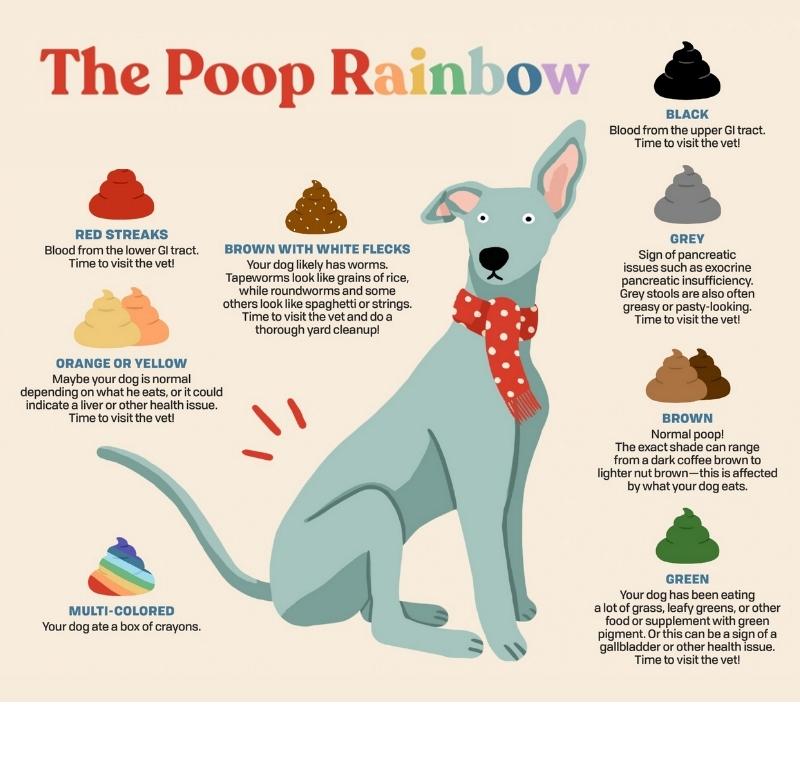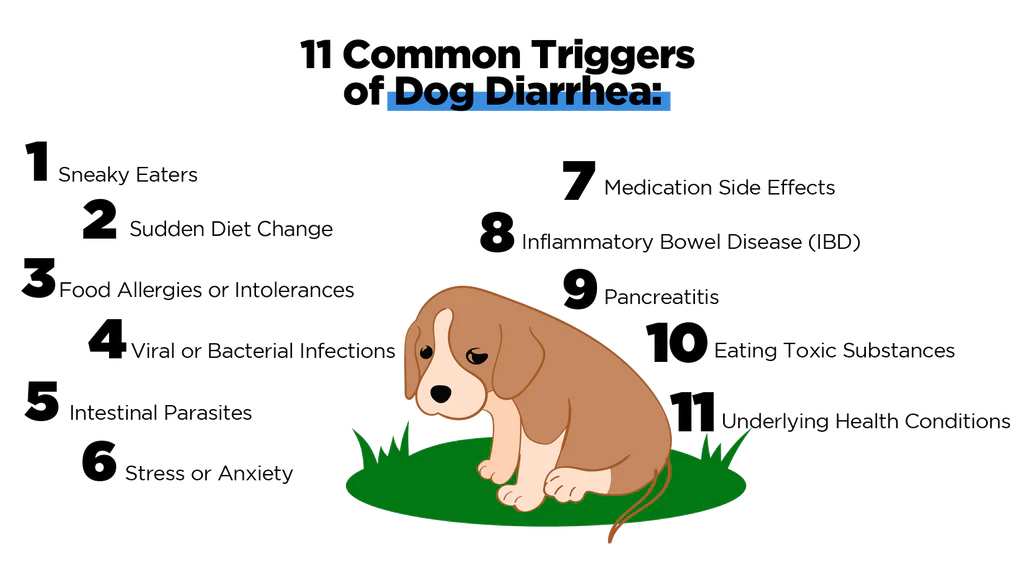Best Foods for Dogs with Diarrhea: 2024 Vet-Approved Diet Guide
When our dogs with diarrhea, it’s not just uncomfortable for them—it’s worrying for us too. Knowing what to feed a sick dog with diarrhea can make all the difference in their recovery. We’ll guide you…
When our dogs with diarrhea, it’s not just uncomfortable for them—it’s worrying for us too. Knowing what to feed a sick dog with diarrhea can make all the difference in their recovery. We’ll guide you through the best dietary choices to help your canine companion get back on their paws.
Feeding a sick dog isn’t just about managing symptoms; it’s about providing the right nutrition to support their healing process. We’ll explore simple, vet-recommended options that are easy on your dog’s digestive system, from bland diets to fiber supplements. By the end of this article, you’ll have a clear understanding of how to nourish your dog back to health, ensuring they receive the care they need during this challenging time.
Understanding Diarrhea in Dogs
Diarrhea in dogs is a common digestive issue that can stem from various causes. Recognizing the underlying factors and knowing when to seek veterinary care is crucial for effective treatment and your dog’s well-being.
Common Causes
Diarrhea in dogs often results from dietary indiscretion, such as eating garbage or spoiled food. Changes in diet, including new treats or sudden switches in food brands, can upset a dog’s sensitive stomach. Stress and anxiety, triggered by events like boarding or traveling, may also lead to loose stools. Medical conditions, including inflammatory bowel disease, liver or kidney issues, and intestinal cancer, can cause persistent diarrhea. Viral infections (e.g., parvovirus), bacterial infections (e.g., salmonella), and parasites (e.g., Giardia, roundworms) are common culprits. Ingestion of foreign objects or toxins can irritate the digestive tract, resulting in diarrhea. Some medications, particularly antibiotics, may disrupt the gut’s bacterial balance, leading to digestive issues.
When to Be Concerned
While occasional mild diarrhea may resolve on its own, certain signs warrant immediate veterinary attention. Seek professional help if your dog’s diarrhea persists for more than 24-48 hours, as prolonged episodes can lead to dehydration. Black, tarry stools or diarrhea containing fresh blood indicate potential internal bleeding and require urgent care.
Accompanying symptoms such as lethargy, loss of appetite, vomiting, or fever suggest a more serious underlying condition. Puppies, senior dogs, and those with pre-existing health conditions are particularly vulnerable to complications from diarrhea and should be monitored closely. If your dog shows signs of severe abdominal pain, bloating, or unproductive attempts to defecate, consult a veterinarian promptly. Dehydration, evidenced by dry gums, sunken eyes, or loss of skin elasticity, is a serious concern that necessitates immediate medical intervention.
Best Foods for Dogs with Diarrhea
When a dog has diarrhea, it’s crucial to provide easily digestible foods that help stabilize their digestive system. Here are some of the best options to consider:
Chicken and Rice
Chicken and rice is a classic, vet-recommended diet for dogs with diarrhea. Here’s why it’s effective:
- Lean protein: Boiled, skinless, boneless chicken breast is gentle on the stomach and provides essential nutrients.
- Easy digestion: White rice, particularly long-grain, is easily digestible and helps firm up stools.
- Optimal ratio: Mix chicken and rice in a 1:2 ratio (one part chicken to two parts rice) for balanced nutrition.
- Gradual introduction: Start with small portions and gradually increase as your dog’s condition improves.
- Hydration: The moisture in cooked chicken helps prevent dehydration, a common concern with diarrhea.
Pumpkin
Pumpkin is a superfood for dogs with diarrhea, offering many benefits:
- High fiber content: Helps regulate the digestive system, alleviating both diarrhea and constipation.
- Nutrient-rich: Contains vitamins A, C, and E, as well as potassium and iron.
- Prebiotic properties: Supports beneficial gut bacteria, promoting digestive health.
- Low in calories: Ideal for maintaining a healthy weight during recovery.
- Versatile use: Can be mixed with other foods or given as a standalone treat.
Always use plain, canned pumpkin, not pumpkin pie filling, which contains added sugars and spices.
Sweet Potatoes
Sweet potatoes are another excellent option for dogs with diarrhea:
- Digestible fiber: Helps firm up stools and regulate bowel movements.
- Rich in nutrients: Packed with vitamins A, B6, C, and minerals like potassium and manganese.
- Antioxidant properties: Beta-carotene supports immune function during recovery.
- Preparation methods: Can be boiled, baked, or mashed for easy consumption.
- Gradual introduction: Start with small amounts to avoid overwhelming the digestive system.
Ensure the sweet potatoes are cooked thoroughly and cooled before serving to your dog.
Bone Broth
Bone broth is a nourishing and soothing option for dogs with diarrhea:
- Easily digestible: Gentle on the stomach and provides essential hydration.
- Rich in nutrients: Contains minerals, amino acids, and collagen for gut health.
- Appetite stimulant: Encourages eating in dogs with reduced appetites.
- Versatile use: Can be served alone or mixed with other foods.
- Homemade option: Prepare by simmering bones for 20-24 hours, removing fat after cooling.
Always serve bone broth at room temperature to avoid burning your dog’s mouth.
Oatmeal
Oatmeal is a beneficial food for dogs recovering from diarrhea:
- Soluble fiber: Helps absorb excess water in the intestines, firming up stools.
- Gentle on digestion: Easy to digest and unlikely to irritate the stomach.
- Nutrient-rich: Contains vitamins B, omega-6 fatty acids, and minerals.
- Preparation: Cook plain oatmeal with water, avoiding milk or additives.
- Gradual introduction: Start with small portions, mixing with other bland foods if needed.
Ensure the oatmeal is cooled to room temperature before serving to your dog.
Feeding Guidelines
When caring for a dog with diarrhea, following proper feeding guidelines is crucial for their recovery. We’ll explore the appropriate portion sizes and meal frequency to help your canine companion’s digestive system heal.
Portion Sizes
When feeding a sick dog with diarrhea, it’s essential to control portion sizes carefully. Start with small, frequent meals rather than large portions. Offer 1/4 to 1/2 cup of food per 10 pounds of body weight initially. For example, a 20-pound dog would receive 1/2 to 1 cup of food per meal. As your dog’s condition improves, gradually increase portion sizes over several days. Monitor your dog’s response to the food and adjust accordingly. If vomiting occurs, reduce the portion size and consult your veterinarian. Remember, each dog’s needs may vary, so observe your pet closely and adjust portions based on their individual response to the bland diet.
Frequency of Meals
Feeding frequency plays a crucial role in managing diarrhea in dogs. Initially, offer small meals 4-6 times per day. This approach helps prevent overloading the digestive system while providing necessary nutrients. As your dog’s condition improves, gradually reduce the frequency to 3-4 meals per day. Continue this feeding schedule for 2-3 days after symptoms subside. Then, slowly transition back to your dog’s regular feeding routine over 5-7 days. During this transition, mix increasing amounts of their regular food with decreasing amounts of the bland diet. Always have fresh water available to prevent dehydration. If diarrhea persists or worsens even though following these guidelines, consult your veterinarian promptly for further evaluation and treatment.

Foods to Avoid
When caring for a dog with diarrhea, it’s crucial to avoid certain foods that can exacerbate the condition or cause further harm. We’ve compiled a list of foods and substances to keep away from your sick dog:
Toxic Foods
Several common foods are toxic to dogs and can worsen diarrhea or cause additional health problems:
- Onions and Garlic: These Allium family members can cause gastroenteritis, anemia, and damage to red blood cells. Signs include lethargy, weakness, and discolored urine.
- Chocolate: Contains theobromine, which can lead to vomiting, diarrhea, heart problems, tremors, seizures, and in severe cases, death. Dark chocolate is more toxic than milk chocolate.
- Xylitol: Found in sugar-free gum, candy, baked goods, and toothpaste. It can cause a rapid drop in blood sugar and liver failure in dogs.
- Grapes and Raisins: Associated with kidney failure in dogs. Symptoms include vomiting, lethargy, and diarrhea.
- Alcohol: Can cause vomiting, diarrhea, coordination problems, breathing issues, coma, and even death.
High-Fat Foods
High-fat foods can irritate your dog’s digestive system and potentially lead to pancreatitis:
- Fried foods
- Fatty meats (e.g., bacon, sausage)
- Dairy products (e.g., cheese, butter, ice cream)
- Greasy table scraps
Spicy and Seasoned Foods
Spices and seasonings can irritate your dog’s stomach and worsen diarrhea:
- Hot peppers
- Curry
- Garlic powder
- Onion powder
- Salt
Raw or Undercooked Meats
Raw or undercooked meats can contain harmful bacteria:
- Raw eggs
- Raw fish
- Undercooked poultry
- Raw ground beef
Sugary Foods and Drinks
Sugary items can upset your dog’s stomach and contribute to dental problems:
- Candy
- Soft drinks
- Sweetened juices
- Baked goods
Processed Foods
Highly processed foods often contain preservatives and additives that can irritate your dog’s digestive system:
- Commercial dog treats
- Human snack foods (e.g., chips, pretzels)
- Cured meats (e.g., hot dogs, deli meats)
Bones and Rawhide
These items can splinter or cause blockages in your dog’s digestive tract:
- Cooked bones
- Rawhide chews
- Large chunks of hard treats
By avoiding these foods and focusing on a bland, easily digestible diet, we can help support your dog’s recovery from diarrhea. Always consult with your veterinarian for personalized advice on your dog’s dietary needs during illness.
Hydration and Electrolyte Balance
Maintaining proper hydration and electrolyte balance is crucial for dogs with diarrhea. Diarrhea can lead to rapid fluid loss, potentially causing dehydration and electrolyte imbalances. Here’s how to manage these aspects effectively:
Provide Fresh Water
Always ensure your dog has access to clean, fresh water. Encourage frequent, small sips rather than large amounts at once. This approach helps prevent overwhelming the digestive system while maintaining hydration.
Consider Electrolyte Answers
For mild cases of diarrhea, electrolyte answers designed for dogs can help replenish lost fluids and minerals. These answers are available over-the-counter at pet stores or through veterinarians. Always follow the recommended dosage instructions.
Monitor Water Intake
Keep track of your dog’s water consumption. If they’re not drinking enough on their own, try offering water from your hand or using a syringe (without the needle) to administer small amounts of water directly into their mouth.
Recognize Signs of Dehydration
Be alert for signs of dehydration, which include:
- Dry, sticky gums
- Loss of skin elasticity
- Sunken eyes
- Lethargy
- Decreased urine output
If you notice these symptoms, contact your veterinarian immediately.
Fluid Therapy
In severe cases of diarrhea or dehydration, veterinary-administered fluid therapy may be necessary. This treatment involves intravenous or subcutaneous fluids to quickly restore hydration and correct electrolyte imbalances.
Ice Chips and Frozen Treats
For dogs reluctant to drink, offer ice chips or frozen low-sodium broth cubes. These can encourage fluid intake while providing a soothing effect on the digestive system.
Avoid Certain Liquids
Steer clear of milk, caffeinated beverages, or sugary drinks. These can exacerbate diarrhea and lead to further complications.
By focusing on proper hydration and electrolyte balance, you’ll support your dog’s recovery from diarrhea and prevent more serious health issues. Remember, severe or prolonged diarrhea requires veterinary attention to ensure appropriate treatment and prevent complications.
Transitioning Back to Regular Diet
Once your dog’s diarrhea has improved and they’ve tolerated the bland diet for a few days, it’s time to transition back to their regular food. We’ll guide you through this process to ensure a smooth return to normalcy.
Gradual Introduction
The key to a successful transition is gradual introduction. Begin by mixing a small amount of your dog’s regular food with the bland diet. Start with a ratio of 25% regular food to 75% bland diet. Maintain this ratio for 2-3 days, monitoring your dog’s stool consistency and overall health.
Increasing Regular Food Portions
If your dog tolerates the initial mix well, gradually increase the proportion of regular food. Move to a 50/50 mix for another 2-3 days, then to 75% regular food and 25% bland diet for an additional 2-3 days. Finally, transition to 100% regular food.
Monitoring Progress
Throughout the transition, closely observe your dog’s:
- Stool consistency
- Appetite
- Energy levels
- Digestive comfort
If you notice any signs of recurring diarrhea or digestive discomfort, slow down the transition process or consult your veterinarian.
Feeding Schedule
Maintain small, frequent meals during the transition period. This approach helps prevent overwhelming your dog’s digestive system. As your dog fully recovers, gradually return to their normal feeding schedule.
Probiotics and Supplements
Consider adding probiotics to support your dog’s digestive health during the transition. These beneficial bacteria can help restore balance to the gut microbiome. Discuss with your veterinarian about appropriate probiotic options for your dog.
Hydration
Continue to ensure your dog has access to fresh water throughout the transition process. Proper hydration supports overall digestive health and helps prevent constipation as you reintroduce regular food.
Special Considerations
For dogs with sensitive stomachs or recurring digestive issues, consult your veterinarian about:
- Long-term dietary changes
- Prescription diets
- Additional supplements to support digestive health
Remember, every dog is unique, and recovery times may vary. If your dog shows any signs of persistent digestive issues or discomfort during the transition, don’t hesitate to seek professional veterinary advice.
Prevention and Long-Term Care
Dietary Management
We recommend implementing a consistent, balanced diet to prevent future episodes of diarrhea. Choose high-quality dog food with easily digestible ingredients and avoid sudden changes in diet. Gradually introduce new foods over 7-10 days, mixing them with the current food in increasing proportions.
Probiotics and Supplements
Incorporating probiotics into your dog’s diet can support digestive health and immune function. These beneficial bacteria help maintain a healthy gut microbiome, reducing the risk of diarrhea. Consult your veterinarian for appropriate probiotic supplements customized to your dog’s needs.
Regular Exercise
Maintaining a consistent exercise routine is crucial for your dog’s overall health and digestive function. Daily walks or playtime sessions help regulate bowel movements and reduce stress, which can contribute to digestive issues.
Stress Reduction
Minimize stressors in your dog’s environment to prevent stress-induced diarrhea. Create a calm, predictable routine and provide a safe space for your dog to retreat when feeling overwhelmed.
Regular Veterinary Check-ups
Schedule regular check-ups with your veterinarian to monitor your dog’s overall health and catch any potential issues early. These visits allow for preventive care and timely adjustments to your dog’s diet or lifestyle if needed.
Parasite Prevention
Carry out a comprehensive parasite prevention program as recommended by your veterinarian. Regular deworming and flea/tick prevention can help avoid parasite-related digestive issues.
Water Quality
Ensure your dog has access to clean, fresh water at all times. Consider using a water filter if your tap water quality is questionable, as contaminants can contribute to digestive upset.
Food Hygiene
Practice proper food hygiene by washing your hands before handling your dog’s food and cleaning food bowls regularly. Store dry food in airtight containers to prevent contamination and maintain freshness.
Portion Control
Avoid overfeeding, which can lead to digestive issues. Follow feeding guidelines based on your dog’s age, weight, and activity level, and adjust portions as needed to maintain a healthy weight.
Avoid Table Scraps
Refrain from feeding your dog table scraps or human food, as these can disrupt their digestive system and lead to diarrhea. Stick to dog-exact treats and foods designed for their nutritional needs.
By implementing these preventive measures and maintaining a consistent long-term care routine, we can significantly reduce the risk of recurring diarrhea episodes in dogs and promote overall digestive health.
Conclusion
Caring for a dog with diarrhea requires attention to diet hydration and overall health. By following the guidelines we’ve outlined you can help your furry friend recover faster and more comfortably. Remember to start with bland easily digestible foods and gradually transition back to their regular diet.
Always prioritize your dog’s well-being and don’t hesitate to consult a veterinarian if symptoms persist or worsen. With proper care and nutrition you’ll be supporting your dog’s digestive health and paving the way for a swift recovery.

